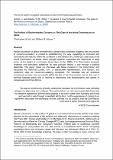Files in this item
The politics of environmental consensus : the case of the World Commission on Dams
Item metadata
| dc.contributor.author | Schulz, Christopher | |
| dc.contributor.author | Adams, William M. | |
| dc.date.accessioned | 2022-12-20T15:30:06Z | |
| dc.date.available | 2022-12-20T15:30:06Z | |
| dc.date.issued | 2023-05-01 | |
| dc.identifier | 282461967 | |
| dc.identifier | 3b4c5289-dbef-46a4-8143-187305e26f0e | |
| dc.identifier | 85159466668 | |
| dc.identifier.citation | Schulz , C & Adams , W M 2023 , ' The politics of environmental consensus : the case of the World Commission on Dams ' , Global Environmental Politics , vol. 23 , no. 2 , pp. 11-30 . https://doi.org/10.1162/glep_a_00687 | en |
| dc.identifier.issn | 1526-3800 | |
| dc.identifier.uri | https://hdl.handle.net/10023/26631 | |
| dc.description | Funding: This work was supported by the UK Research and Innovation Economic and Social Research Council [ES/P011373/1] as part of the Global Challenges Research Fund. | en |
| dc.description.abstract | Recent discussion of global environmental assessment processes suggests that the process of consensus-creation is central to understanding the way knowledge is produced and conclusions are reached. Here we contribute to this literature by providing a case study of the World Commission on Dams, which brought together supporters and opponents of large dams, at the height of controversy about dams in the 1990s. The Commission reviewed evidence and formulated guidelines for best practice, finding a way through a political stalemate. The paper draws on interviews with those involved in the Commission and discusses the historical context, form of stakeholder representation, time horizon, and leadership style as consensus-enabling conditions. We conclude that an ambitious consensual process was successful within the life of the Commission, but at the cost of carrying external actors with it, leading to challenges with dissemination and uptake of consensual recommendations. | |
| dc.format.extent | 20 | |
| dc.format.extent | 411418 | |
| dc.language.iso | eng | |
| dc.relation.ispartof | Global Environmental Politics | en |
| dc.subject | GE Environmental Sciences | en |
| dc.subject | J Political Science | en |
| dc.subject | T-NDAS | en |
| dc.subject | MCC | en |
| dc.subject | NCAD | en |
| dc.subject.lcc | GE | en |
| dc.subject.lcc | J | en |
| dc.title | The politics of environmental consensus : the case of the World Commission on Dams | en |
| dc.type | Journal article | en |
| dc.contributor.institution | University of St Andrews. School of Geography & Sustainable Development | en |
| dc.identifier.doi | https://doi.org/10.1162/glep_a_00687 | |
| dc.description.status | Peer reviewed | en |
| dc.date.embargoedUntil | 2022-11-30 |
This item appears in the following Collection(s)
Items in the St Andrews Research Repository are protected by copyright, with all rights reserved, unless otherwise indicated.

